From café corners to cash flow
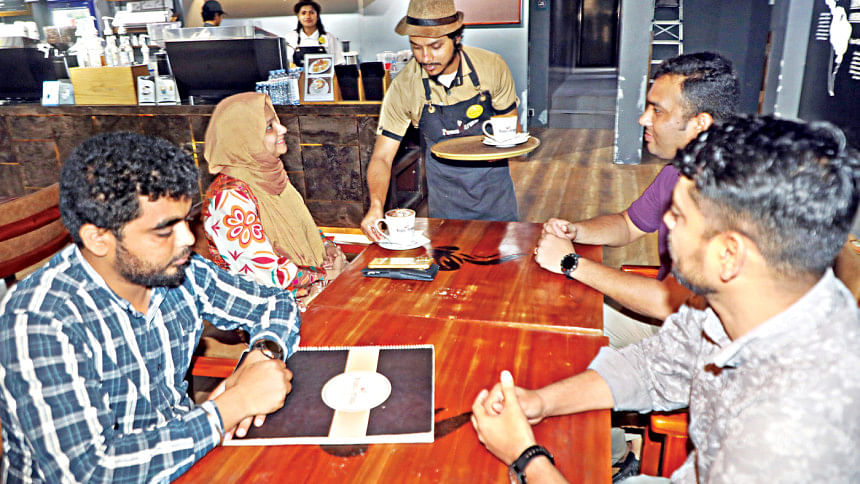
Once considered high-priced, cold brew coffee and espresso-based drinks have become a defining feature of urban life in Bangladesh, blending community, creativity and culture in every cup.
From quiet locations in lively neighbourhoods to sleek establishments filled with freelancers and students, the coffee scene is no longer just about beverages. It is about a sense of belonging and identity in a rapidly changing cityscape.
Industry people say there has been a slow yet steady change in generational preferences over the past decade and a half, with the prevalence of social media having contributed to the paradigm shift in taste and preferences.
Economic growth and the subsequent boom in disposable incomes also contributed to the rise, drawing more people towards aspirational lifestyles and the cafe culture.
The modern coffee shop trend began gaining momentum in Bangladesh around 2010, especially in cities like Dhaka and Chattogram, driven by the rise of the cafe culture and lifestyle-based hangout spots, according to industry people.
In Dhaka, trendy cafes are visible in neighbourhoods such as Dhanmondi, Banani, Uttara and Mirpur, which now host dozens of such establishments.
In the mid-2000s, Coffee World was one of the few places one could visit for premium coffee, but cafes really came into vogue around 2012, challenging the status quo which firmly had tea as the undisputed king of beverages.

However, many cafes have sprung up since, becoming frequent haunts where young professionals and students are often spotted working side-by-side on laptops.
These outlets serve as de facto co-working spaces, offering essential amenities like Wi-Fi, electrical outlets and a quiet ambience.
North End Coffee Roasters, a local brand that began with a sleepy outlet in 2011, is generally considered a pioneer in the field, which quickly became populated by international chains like Gloria Jean's Coffees in 2011 and Crimson Cup afterwards.

Local brands like Beans & Aroma Coffees followed suit with an outlet in Uttara in 2014. Today, they have three outlets in Dhaka, with a fourth currently under construction.
Tariqul Islam, chairman of Beans & Aroma Coffees Limited, said the period from 2015-2017 was a real turning point as small boutique cafes became commonplace.
This is because the popularity of third-wave coffee ideas, including artisanal blends and high-quality brewing gained traction, he said.
Moreover, the social media marketing of "instagrammable" café spaces drew in the youth.
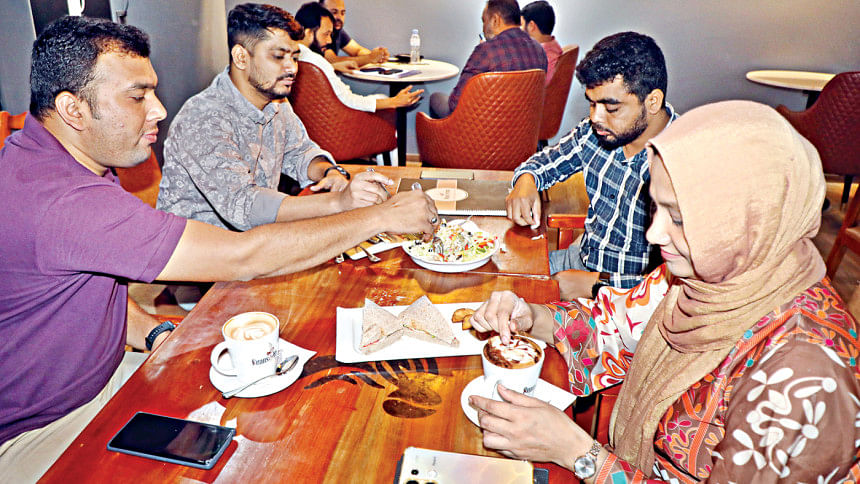
He added that coffee has been marketed more as a lifestyle than just a drink in recent times, a strategy that attracted the burgeoning young population, comprising freelancers, startup techies and students alike.
Young Bangladeshi entrepreneurs in great numbers invested in independent local cafés, not relying on franchises, to exhibit their taste in décor and baked goods, he added.
However, Islam pointed out that the high cost of importing premium beans due to exorbitant duties and scarcely developing local coffee plantations pose real challenges to the growing industry.
Other challenges include high real estate costs, lack of trained and skilled baristas.
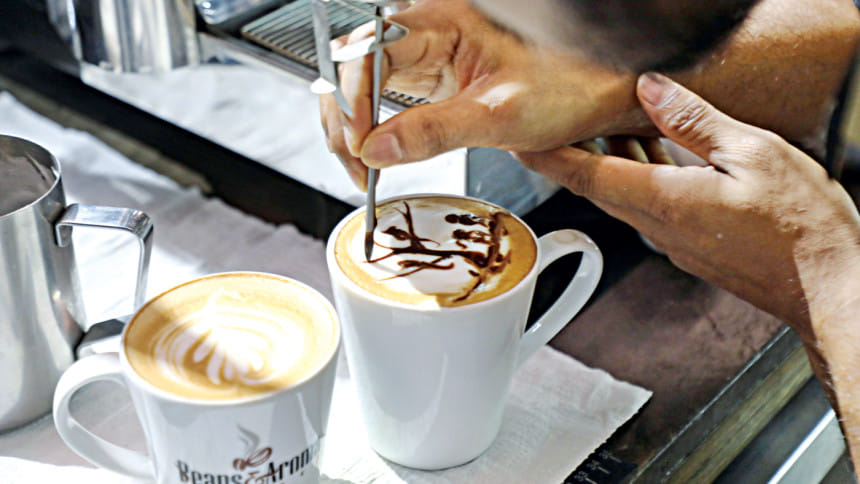
Market saturation in upscale neighbourhoods is another major concern, especially as the establishment of new cafes accelerated sharply after Covid-19 restrictions were lifted, he added.
In terms of customers, the 18–40 age group dominates the market. Middle to upper-middle class, urban, social media-savvy, and health-conscious people are the predominant strata of the society that frequent cafes.
Although the trend remained largely confined to Dhaka and Chattogram for a long time, it is now starting to spread to places like Sylhet, Khulna, Rajshahi, and Cox's Bazar. University towns such as Sylhet are showing growth potential, thanks to youth-driven demand, they added.
Jewel Das, area manager of Coffee World, said they were the first international coffee chain to start operations in Bangladesh in 2005 with the opening of an outlet in Banani.
Within the next three months, they opened four more outlets. They have also finalised locations for two new coffee shops, he said. Work is set to begin soon, and the outlets are expected to open by November this year.
"When we started our business, people weren't that used to coffee. Back then, only around 20 percent of people were familiar with it. Now, that figure has grown to 70 percent," he said.
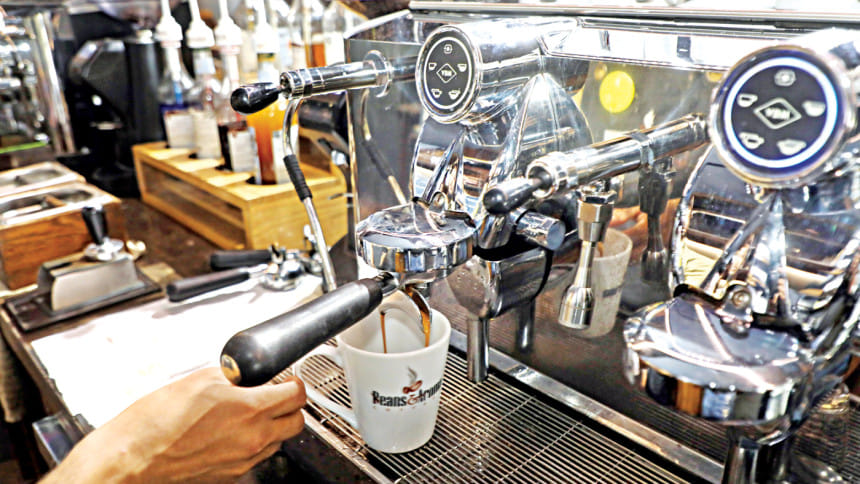
The supply chain has also matured to an extent. Previously, coffee beans had to be imported to run the business. Although still in small quantities, coffee beans are now being produced in Bangladesh, he added.
Amit Costa, assistant manager of Awake Cafe & Bistro, said they entered the business in 2023 with the goal of providing a premium and cosy experience for urban customers in Dhaka.
He said the response has been very encouraging, with increasing interest in speciality coffee and comfortable social spaces.
"Over time, our customer base has grown consistently, forming a loyal community of regulars," he said.
Starting with one outlet in the Bashundhara residential area, the company is now working on opening another in the same location.
They have invested around Tk 8 crore into the business, covering outlet setup, staff training, equipment, marketing, and supply chain.
Their customer base includes young professionals, university students, freelancers, and entrepreneurs, with families and businessmen also frequenting the cafe due to its welcoming ambience and reliable internet.
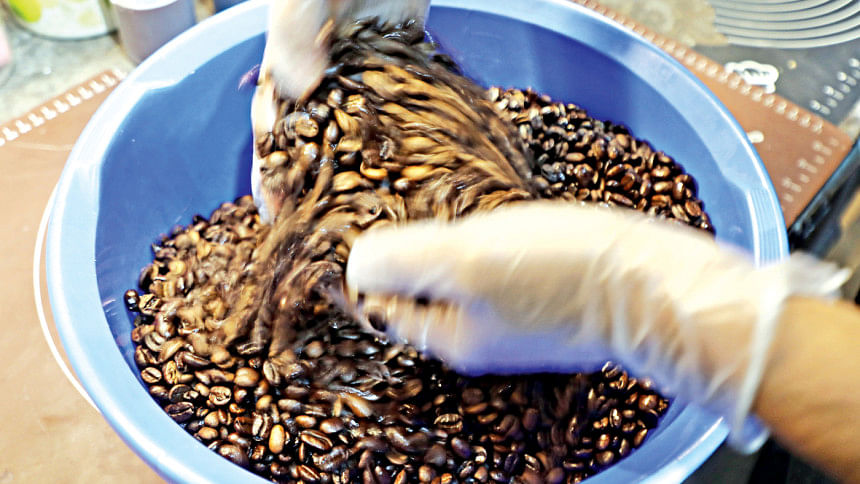
Ahanaf Sayeed, managing director of Maclarens, recalled that in 2018, spending Tk 350 to Tk 400 on a cup of coffee was considered too expensive for most people.
"You could have a full meal for that price. But now it is quite normal. Coffee shops have become culturally accepted in Bangladesh. We are seeing both young people and the older generation embracing cafe culture," he said.
Maclarens opened in January last year. Initially, daily sales ranged between Tk 1,500 and Tk 2,000. At present, sales stand at around Tk 20,000 to Tk 30,000.
Sayeed plans to open a second branch in Motijheel in September.
"After that, we intend to expand gradually into areas where café culture has not yet arrived," he said.
In many neighbourhoods, coffee is now served alongside tea at roadside stalls, often accompanied by cheerful chatter. As a result, coffee is quickly gaining popularity among tea drinkers.
Rafiul Islam, a third-year university student, said he often goes to coffee shops to relax between classes or after long hours of study.
"It's a comfortable place to hang out with friends, work on group assignments, or even spend some alone time," he said.
Sharmin Akhter, an executive at a private company, said she sometimes prefers coffee shops for work purposes as well.
"Sometimes I meet clients or hold small meetings at coffee shops," she said. "The relaxed environment makes discussions easier. I also occasionally work from there just to enjoy a change of atmosphere."
Shamima Akhter, director of corporate affairs, partnerships and communications at Unilever Bangladesh Ltd, said offices are no longer defined by four walls, especially for Gen Z.
Also, post-Covid, the concept of working a full five days from the office has also changed, and line managers do not feel the need to see their teams sitting inside the office, she said.
Rather, the concept of hybrid has become the norm and it resonates well with the youth. It gives them a feeling of empowerment and freedom, she added.
Akhter added that office workers love to hang out in coffee shops with teams and even with clients. While meeting rooms are available in the office, having a meeting at a midpoint, a kind of neutral venue, is accepted as well.
She said coffee shops are well decorated, provide good Wi-Fi, and, most importantly, offer a diverse menu suitable to all palates.
"Coffee shops are great places for team building, too. During a team hangout, we do finish work as well, but it is much more friendly than sitting inside a meeting room," she added.
"Also, we must not forget that food is a big part of Bangladeshi culture. So, I can attend a call while enjoying good food against the backdrop of a great venue without any further cost."
Whether it is students discussing coursework, young professionals holding informal meetings or artists brainstorming their next big project, coffee shops have become the unofficial social hubs of urban Bangladesh.
This shift has caught the attention of major companies and industrial groups, which are now entering the booming market by opening new outlets and launching local coffee brands.
With the market growing steadily, Bangladesh's coffee culture is fast becoming a reflection of modern urban identity, blending tradition with global influences.
Whether for work, leisure or connection, coffee now stands at the centre of city life, brewing not just drinks but conversations, creativity and community.
Nestle was the first to formally market coffee in Bangladesh, starting in 1998.
Nestlé Bangladesh Limited observed that the nation's evolving coffee culture mirrors a broader socio-economic shift driven by youth preferences and global influence.
With a large segment of the population under 30, the move from traditional tea stalls to modern cafés underscores changing urban lifestyles, it said.
The statement also said that the rise of café culture, particularly from the 2010s onward in Dhaka and Chittagong, is closely tied to increased exposure to Western trends via media and travel.
Despite the booming coffee culture in Bangladesh, coffee shop owners face significant challenges in sustaining and scaling their businesses, it said, adding that these challenges often include dependence on imports, limited local production and rising input costs.
The statement said coffee culture has slowly started to permeate smaller towns as well.
Coffee market grows at 56% annually
Just a decade ago, large industrial groups had little presence in Bangladesh's coffee market. At the time, Swiss multinational Nestle dominated the sector, meeting most of the demand.
Besides Nestle, a few small companies imported and distributed coffee on a limited scale.
However, with changes in consumer food habits, several industrial groups and companies have since entered the market.
While tea consumption in Bangladesh has grown by 5 percent annually over the past 10 years, the coffee market has expanded by 56 percent per year, according to official figures.
Import data shows that in 2012, Bangladesh imported 264 tonnes of coffee. A decade later, in 2022, this figure jumped to 1,745 tonnes, an average annual growth of 56 percent.
In other words, demand for coffee is growing 11 times faster than that for tea. Still, tea remains dominant, with a market size 53 times larger than that of coffee.
Companies involved in coffee marketing report that coffee is consumed in only 15 percent of households in Bangladesh while the figure for tea stands at over 90 percent.
But with the rise of coffee culture, this figure is steadily increasing.
Currently, Bangladesh imports coffee from around 40 countries, including eight of the world's top 10 coffee producers. Notably, 88 percent of imports come from just five countries, namely India, Indonesia, Malaysia, Brazil and Vietnam.

 For all latest news, follow The Daily Star's Google News channel.
For all latest news, follow The Daily Star's Google News channel. 








Comments